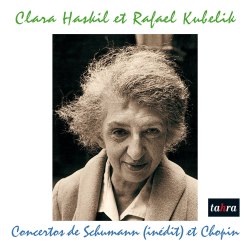| 
|
Robert SCHUMANN (1810-1856)
Piano Concerto in A minor, Op.54 (1841-45) [28:42]
Fryderyk CHOPIN (1810-1849)
Piano Concerto No.2 in F minor, Op.21 (1829) [31:18]
Clara Haskil (piano)
Danish Radio Symphony Orchestra (Schumann)
Orchestre de la Société des Concerts du Conservatoire (Chopin)/Rafael Kubelík
rec. live, 17 February 1955, Copenhagen (Schumann) and live, 31 January 1960, Paris
TAHRA TAH 736 [60:29]
Both these live performances come from Clara Haskil’s last years. They post-date her exclusive Philips contract, though in truth she was released from her clause on a couple of occasions to record for DG and Columbia. Still, it proved impossible to pair her and Rafael Kubelik in the studio, as Decca would not release the conductor to record all the Mozart Concertos, a project that Haskil and Kubelik were keen to carry through together. Given the level of mutual respect between the two musicians, and how much they enjoyed their necessarily limited collaborations, the loss of the concerto cycle can be acutely felt.
Tahra notes that there are seven documented meetings between the two, the first dating from 1950 at the Hague with the Concertgebouw, and the last being this Chopin performance in Paris in 1960. Their repertoire was predictably dominated by Mozart - three different concertos - and by two performances each of the Schumann and the Chopin No.2 concertos. The 1955 Danish meeting took place in Copenhagen and was the second time that they performed the Schumann. Maybe the earlier occasion was the one in which the conductor had gently to usher a reluctant Haskil onto the steps of the auditorium of the Concertgebouw, a story related in the notes.
It was a work she’d earlier recorded with van Otterloo, and though the resultant performance was admired, Haskil herself had strong reservations about it, indeed labelling it ‘lousy’. There’s nothing lousy about this Danish meeting which is full of lyric plasticity but sure underlying pulse. It’s also significant to note how the question of conductors informs subtle interpretative matters. When Haskil was taped live in this work with the Suisse Romande and Ernest Ansermet the following year [Claves 50-2408, coupled with a 1960 Beethoven’s C minor Concerto] the proportions of the work are slightly different in the central slow movement, where one finds that there’s a greater liveliness with Kubelík. The only demerit to this Copenhagen performance is not the performers’ fault. Two minutes are missing at the end of the second movement, leading into the finale. It’s particularly noticeable in the first minute of the finale, where the piano sound - which was taken from a Haskil performance from 1953 with Paul Kletzki - is murky and watery and then suddenly opens up when the original recording returns after this brief excision. The finale is elegant, poised and delightfully done. Applause is retained.
The Chopin collaboration took place in Haskil’s last year. The Parisian strings are shrill and made the more so by an acidic recording quality. The pianism, however, is refined, elegant once again - of course - and in the slow movement one can shield oneself from the string incursions via her poetic limpidity. Genuine dancing rhythms inform the finale, and one feels both Haskil and Kubelik relishing this vital music together, and in one accord. Again, applause is retained.
This is a fine disc that does what it can with the two-minute excision in Copenhagen. The Schumann is making its first-ever appearance in this Tahra release, though the Chopin has been issued before. Admirers of the conductor will know that he left behind two excellent studio cycles of Schumann’s Symphonies and they will know to expect similar virtues in his accompaniment in the concerto. If only the two had recorded that Mozart cycle.
Jonathan Woolf
Masterwork Index: Schumann piano concerto
 |
 |
|

